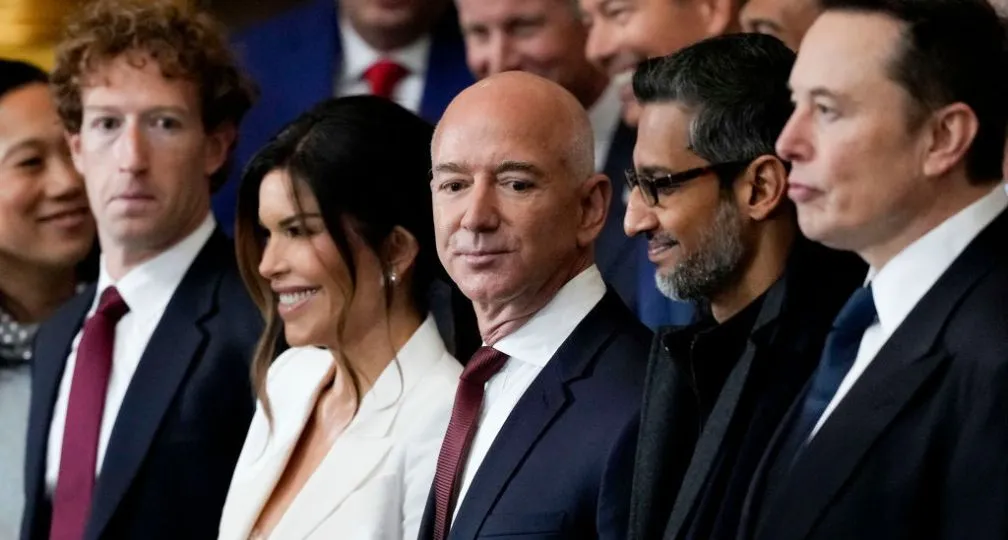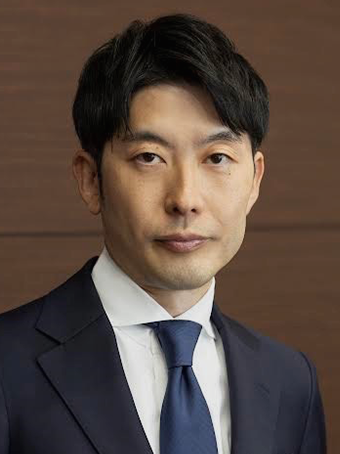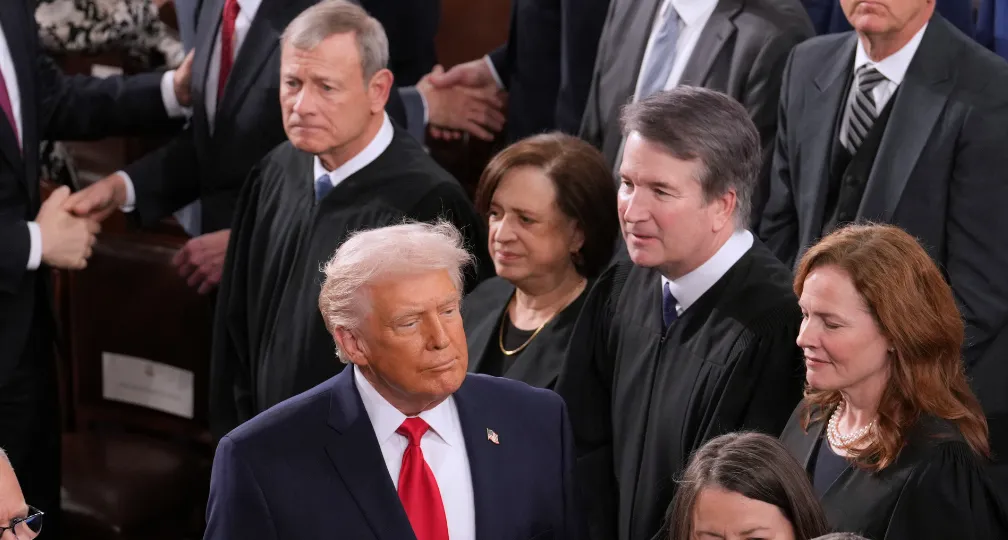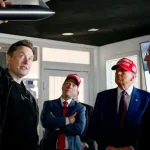Trump and America’s tech giants: Coexistence or collaboration?

That shouldn’t be terribly surprising. Corporate behavior in Silicon Valley often mirrors the personal beliefs and temperament of founder-CEOs. President Trump, for his part, is drawn to strong personalities and prefers direct dialogue with government and corporate leaders. So while his first term was defined by sharp clashes with Big Tech, his second term has clearly entered into a more cooperative phase — on both the part of the president and the oversized personalities that rule Silicon Valley.
The second Trump administration is attempting to reshape the global economy through its reciprocal tariff policies, which the White House sees as a tool to bring manufacturing back to the United States. But these tariffs are likely to push up consumer prices and even American companies with globally integrated supply chains will face higher costs. While Big Tech can sustain revenues from digital services, companies with major hardware operations — such as Apple with its iPhone business — or those with retail exposure like Amazon are likely to see costs rise.
According to Trump, “Jobs and factories will come roaring back into our country” as a result of his second-term tariffs. But his protectionist policies face steep hurdles. Business leaders may treat tariffs as a short-term trend, limiting incentives to relocate production bases. Even if they do, moving facilities takes years and will not deliver immediate job gains. New factories are highly automated and generate fewer jobs, while decades of deindustrialization have left the U.S. short of skilled workers. Restoring manufacturing and employment within Trump’s term will not be easy.
The impact of Trump’s policies on online platforms is also significant. During his first term, Big Tech faced intense antitrust pressure. For instance, the Justice Department sued Google in October 2020, accusing it of monopolistic practices in the search market, where it controls 90%. Two months later, the Federal Trade Commission filed an antitrust case against Meta (formerly Facebook) arguing its acquisitions of rivals stifled competition.
FTC v. Meta Platforms, Inc., alleges that Meta illegally monopolized the market for “personal social networking services” through its acquisitions of Instagram and WhatsApp. Depending on the outcome of the trial, which finally began in April 2025, Meta could be forced to unwind its purchases of WhatsApp and Instagram. Meta CEO Mark Zuckerberg, understanding the sway Trump has over the FTC, has visited the president several times since January reportedly seeking intervention in the case.
During Trump’s first administration, freedom of speech on social media and the issue of censorship became a major battleground. The conflict centered on Section 230 of the 1996 Communications Decency Act, which has shielded platforms from liability for user content. Courts traditionally upheld broad protections in the name of free expression, but Trump and Republicans argued platforms were politically biased and censoring conservative voices. The administration attempted, via executive order, to limit platforms’ ability to restrict or remove user posts, claiming the government had to protect free speech.
The debate intensified after the death of George Floyd — an African-American man who was murdered by a white police officer in the city of Minneapolis on May 25, 2020 — which sparked nationwide protests. Trump’s tweets during the unrest were widely criticized as glorifying violence. Meta countered that restricting Section 230 would limit rather than expand free speech. The clash reached its peak in January 2021, when Facebook suspended Trump’s account for 24 hours during the assault on the U.S. Capitol and three days later he was suspended from Twitter.
Trump’s first term, then, was marked by fierce battles with Big Tech over both antitrust law and social-media censorship. Yet during the Biden presidency (2021-2025), social media platforms themselves began to shift. In October 2022, Twitter — now X — was acquired by Elon Musk, who swiftly dismissed top executives and rolled back much of the content moderation staff and even reinstated Trump’s account, presenting himself as a “free speech absolutist.” Critics argued this allowed inappropriate posts to flourish.
Meta also shifted course. In January 2025, just before Trump’s return to office, it abolished its third-party fact-checking program, replacing it with volunteer-driven mechanisms. Zuckerberg, who has said fact-checkers are politically biased, appeared eager to distance Meta from the role of arbiter of truth. His personal stance toward Trump also changed: After Trump survived an assassination attempt during the 2024 campaign, famously raising his fist while bloodied, Zuckerberg called the moment “one of the most badass things I’ve ever seen in my life.”
By the time of Trump’s inauguration in 2025, signs of rapprochement between Big Tech and the White House were clear. Political calculation played a role, but so too did the ferocious competition among the tech giants themselves.
The main battlefield for Big Tech competition is generative artificial intelligence, better known as AI. To stay ahead of their domestic and Chinese rivals, Big Tech firms seek access to cutting-edge semiconductors and the freedom to innovate with top talent. To secure this environment, they need favorable policy from Washington.
Soon after returning to office, Trump repealed the Biden administration’s AI regulations — Executive Order 14110, which stressed safety and privacy — and signed Executive Order 14179, Removing Barriers to American Leadership in AI. This move expanded freedom for AI development and was welcomed by Silicon Valley.
In July, building on EO 14179, the Trump administration unveiled its AI Action Plan: Winning the AI race. Its pillars include boosting American AI exports, promoting rapid buildout of data centers and upholding free speech in frontier models. Another Trump executive order launched the AI Export Program, instructing the Commerce Department to develop and deploy a full-stack U.S. AI export package explicitly aimed at cementing American leadership and countering China.
Trump also issued an order titled Preventing Woke AI in the Federal Government. In U.S. politics, “woke” is a disparaging term for progressive values. The order argued that diversity, equity and inclusion, known as DEI, undermine AI neutrality and demanded that large language models avoid producing responses biased toward liberal ideology. Early critics claimed that systems like ChatGPT’s responses seem to lean liberal, and today LLMs serve as the reasoning engines behind AI agents. Trump’s directive to intervene in their ideological orientation was therefore striking — echoing his earlier clashes with social media.
This stance could have far-reaching implications for U.S. allies. Many democracies value American LLMs precisely because they contrast with China’s state-controlled versions by reflecting liberal norms. Restricting them risks undermining that appeal.
Big Tech and President Trump, once adversaries, appear to be moving toward a more reciprocal relationship. Both Trump and Big Tech CEOs are highly individualistic leaders whose actions are shaped by ideology and personal ties. How these personalities influence debates over values embedded in AI — whether in free expression, neutrality or social ideology — will be critical to watch. Ultimately, this is about who governs the values within AI and how they are managed, an issue of profound importance for liberal democracy.
Whether in the United States or China, the winner of the AI race will export not only technology but also the ideology within it. For U.S. allies and like-minded nations, this raises an urgent challenge: to weigh not only the capabilities but also the ideological orientation of the AI systems they adopt.
(Photo Credit: Getty Images)
Disclaimer: The views expressed in this IOG Geoeconomic Briefing do not necessarily reflect those of the API, the Institute of Geoeconomics (IOG) or any other organizations to which the author belongs.
API/IOG English Newsletter
Edited by Paul Nadeau, the newsletter will monthly keep up to date on geoeconomic agenda, IOG Intelligence report, geoeconomics briefings, IOG geoeconomic insights, new publications, events, research activities, media coverage, and more.


Group Head, Emerging Technologies,
Director of Management
Makoto Shiono holds a B.A. in Political Science from the Faculty of Law at Keio University and a Master of Laws (LLM) from Washington University (St. Louis) School of Law. He served as a member of the planning committee of the Intellectual Property Strategy Headquarters, Cabinet Office; the Working Group on Key and Strategic Areas, National Standards Strategy Subcommittee, Cabinet Office; and the Working Group of the Green Innovation Project Subcommittee of the Industrial Structure Council. He also participated in drafting the Ethics Guidelines (2017) as a member of the Ethics Committee of the Japanese Society for Artificial Intelligence. [Concurrent Positions] Co-Managing Director & CLO, IGPI Group Director & Managing Director, Industrial Growth Platform, Inc. (IGPI) Member, Startup Investment Committee, Japan Bank for International Cooperation(JBIC) Executive Officer, JBIC IG Partners
View Profile-
 The Supreme Court Strikes Down the IEEPA Tariffs: What Happened and What Comes Next?2026.02.27
The Supreme Court Strikes Down the IEEPA Tariffs: What Happened and What Comes Next?2026.02.27 -
 Fed-Treasury Coordination as Economic Security Policy2026.02.13
Fed-Treasury Coordination as Economic Security Policy2026.02.13 -
 What Takaichi’s Snap Election Landslide Means for Japan’s Defense and Fiscal Policy2026.02.13
What Takaichi’s Snap Election Landslide Means for Japan’s Defense and Fiscal Policy2026.02.13 -
 Challenges for Japan During the U.S.-China ‘Truce’2026.02.12
Challenges for Japan During the U.S.-China ‘Truce’2026.02.12 -
 India and EU Sign Mother of All Deals2026.02.09
India and EU Sign Mother of All Deals2026.02.09
 Orbán in the Public Eye: Anti-Ukraine Argument for Delegitimising Brussels2026.02.04
Orbán in the Public Eye: Anti-Ukraine Argument for Delegitimising Brussels2026.02.04 Fed-Treasury Coordination as Economic Security Policy2026.02.13
Fed-Treasury Coordination as Economic Security Policy2026.02.13 India and EU Sign Mother of All Deals2026.02.09
India and EU Sign Mother of All Deals2026.02.09 When Is a Tariff Threat Not a Tariff Threat?2026.01.29
When Is a Tariff Threat Not a Tariff Threat?2026.01.29 Navigating Uncertainty in U.S. Space Policy: Decoding Elon Musk’s Influence2025.04.09
Navigating Uncertainty in U.S. Space Policy: Decoding Elon Musk’s Influence2025.04.09













